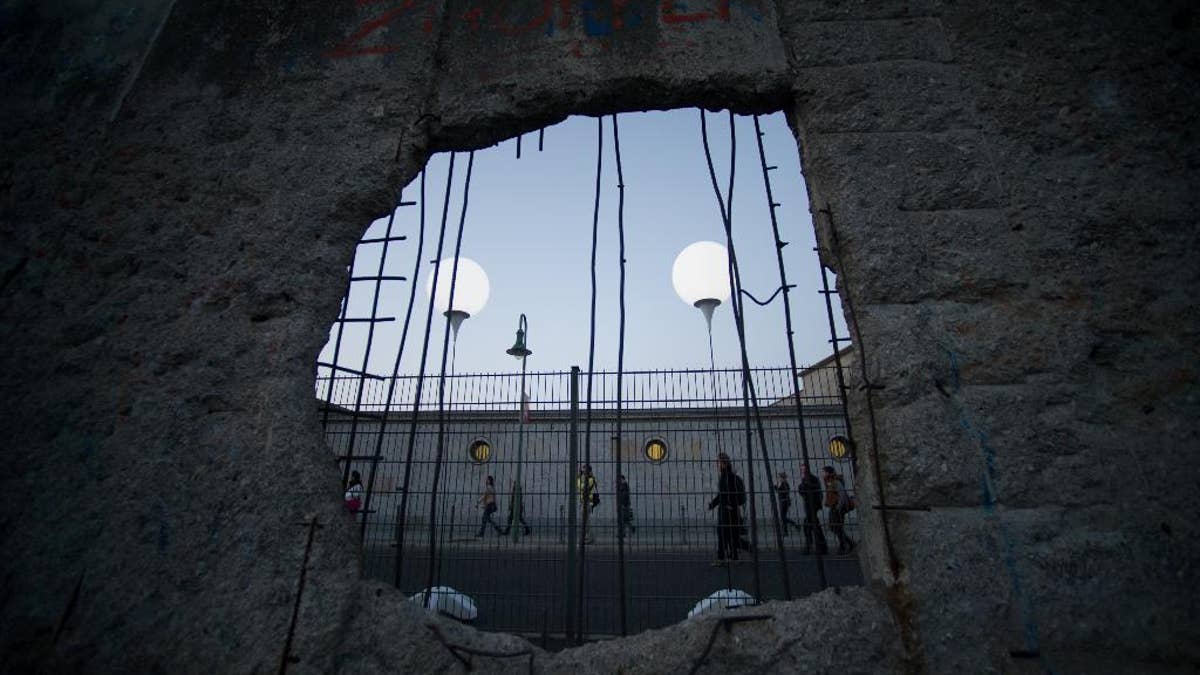The Berlin Wall: Fast facts
Ronald Reagan made his iconic “tear down this wall” speech 30 years ago. Here are some fun facts about the infamous Berlin Wall
Thirty years ago today, President Ronald Reagan stood at the Berlin Wall and publicly demanded of Russia’s Mikhail Gorbachev: “Tear down this wall.”
Two years later, the heavily guarded wall that had divided Germany for 28 years -- and kept East Germans virtual prisoners of Russian socialism -- was dismantled. Germany was on the road to reunion and an icon of Marxism gone.
On June 12, 1987, some 20,000 cheered the American president’s speech challenging Gorbachev to deliver on his avowed commitment to international peace and progressive policies. His challenge was heard around the world: "General Secretary Gorbachev, if you seek peace, if you seek prosperity for the Soviet Union and Eastern Europe, if you seek liberalization: Come here, to this gate. Mr. Gorbachev, open this gate. Mr. Gorbachev, tear down this wall."

People pass by balloons of the art project 'Lichtgrenze 2014' (lit. 'lightborder 2014') photographed through a hole in remains of the berlin Wall in Berlin, Germany, Friday, Nov. 7, 2014. The light installation featuring 8,000 luminous white balloons commemorates the division of Berlin where the 25th anniversary of the fall of the wall is marked with numerous events on the weekend. (AP Photo/Steffi Loos) (The Associated Press)
East Germany’s Communist government claimed it built the wall primarily to keep enemies out, but between 1949 and 1961 more than 2 million had escaped the police state. The wall -- erected virtually overnight in August 1961 – cut that hemorrhage to a trickle.
SLIDESHOW: REAGAN'S IMPACT ON BERLIN WALL
Still, a few were able to breach the barrier even as some 140 lost their lives trying to escape to freedom in West Germany.
This wall will fall. For it cannot withstand faith. It cannot withstand truth. The wall cannot withstand freedom.
Reagan, a persistent and eloquent condemner of communism, turned a visit to West Berlin into a defining moment in history with one of his most memorable orations.
“This wall will fall,” Reagan said. “For it cannot withstand faith. It cannot withstand truth. The wall cannot withstand freedom.”
And so it was that in 1989 the East German government opened the border. Germans went wild, taking to the wall with hammers and singing and dancing by it.
By defeating communism, Ronald Reagan ended one of history's most violent centuries and opened the door to the possibility that...democracy might become available to more of the people who wanted it.
“How did he do it, those puzzled intellectuals still ask?” an essay in the Economist, referring to Reagan, asked. “By being primarily American: nonchalant, ever-hopeful, tough as an old boot when necessary.”
“By defeating communism, Ronald Reagan ended one of history's most violent centuries and opened the door to the possibility that for at least a few decades ahead, war, though it can never be abolished, would be a smaller horror than in the past, and democracy might become available to more of the people who wanted it,” the essay said. “In his foreign policy, at any rate, he turned out to be one of the two or three most effective American presidents of the 20th century."










































